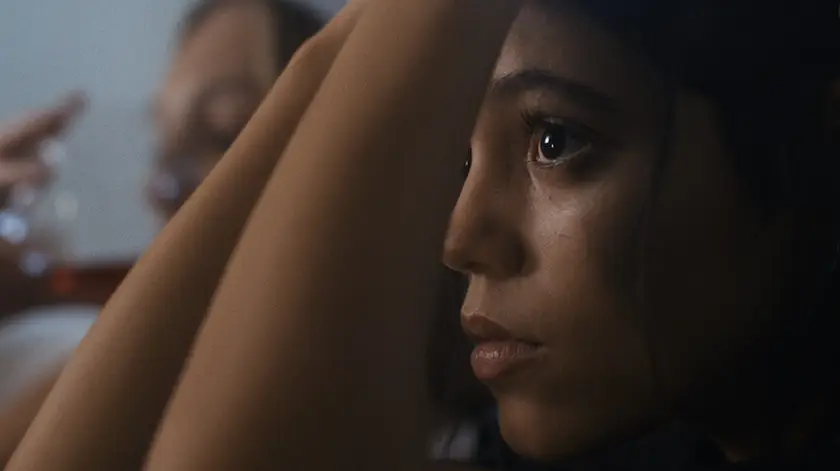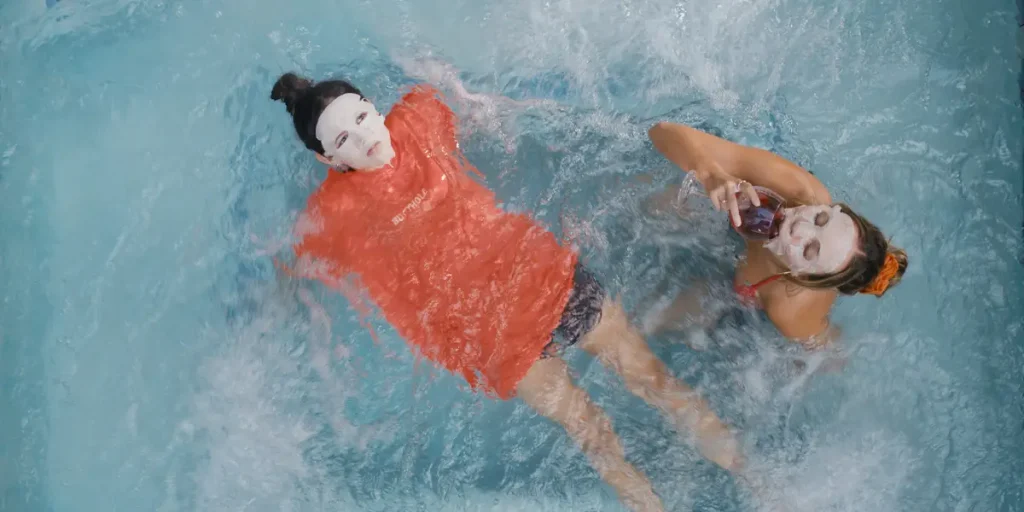The Fallout tackles troubling and timely subject matter with harrowing honesty as Jenna Ortega anchors the entire affair in her admirably authentic performance.
Columbine. Sandy Hook. Parkland. Time and time again, we witness the same narrative play out after yet another tragic school shooting takes place in America – the woeful week of mourning, the public outcry for political action, and then, the subsequent societal amnesia. When the 7-10 days of shock and sadness have worn off, the media moves on to the “next big thing,” and the public follows suit, eager to erase such sorrow from their minds. Just when it seems as if this will be time that we can truly pressure those in power to enact concrete legislative change in the area of gun control, the cycle always restarts, and they’re let off scot-free, laying the foundation for more misfortunes to occur in the future. Grieve. Get over it. Rinse. Repeat.
And yet, while it seems like most of the world has become content to submit to this cycle and normalize such chaos, in the aftermath of each school shooting, there are always those who can’t make that choice. Those who don’t get to just change the channel, turn the page, or keep scrolling on social media. Those who have to carry the burden of bearing witness to this barbarity with them for the rest of their lives – an experience they were forced to endure with no say in the matter whatsoever and an act of inhumanity that will forever be ingrained in their brains. Some are able to turn their anguish into action, adopting activism as a means of processing their suffering in a substantial way that can contribute to the community at large as well – see the students of Marjory Stoneman Douglas High School. However, there are countless others whose stray from the spotlight, internalizing their trauma and struggling in silent – and The Fallout shows one such story.
When 16-year-old Vada (Jenna Ortega, of Yes Day, Miller’s Girl and the upcoming Scream sequel) catches a ride to school with her best friend Nick (Will Ropp, of The Way Back and Silk Road) on the day of “the incident,” she has not a care in the world, luxuriating in the liveliness of her adolescence and waving all her worries away. Later on in class, Vada sustains her first surprise of the day, excusing herself to head to the bathroom and answer an “urgent” phone call from her frantic sister Amelia (Lumi Pollack) – a plea for support as she experiences her first period (causing Vada to roll her eyes after expecting something far more serious). Here, she encounters the mega-popular Mia (Maddie Ziegler, of Lifetime’s Dance Moms and Music), who is stylizing her makeup instead of attending to her schoolwork. The two polar opposite personalities start to strike up a conversation – and then the gunshots break out.
Terrified, the girls shut themselves in a bathroom stall, covering their cries as the screams of their schoolmates can be heard throughout the halls. For minutes on end, the clamor continues, and soon, another student named Quentin (Niles Fitch, of Roman J. Israel, Esq. and Secret Society of Second Born Royals) barges in, avoiding the anarchy outside and seeking solace and safety. As Vada, Mia, and Quentin huddle together in fear, a bond is born between the three due to this collective torment, and when the dust settles, no one will be the same.

Nick, who thankfully survives the shooting as well, is sparked to start a movement to make change with a campaign for increased gun legislation, but Vada refrains from joining him on this crusade, unable to understand how to properly push forward after the pains of her past. At first, she remains distant and dazed, detaching herself from reality and petrifying her parents Patricia (Julie Bowen, of Modern Family and Hubie Halloween) and Carlos (John Ortiz of Silver Linings Playbook and Ad Astra), who suggest that she talk with a therapist named Anna (Shailene Woodley, of The Fault in Our Stars and Divergent). However, Vada considers alternative means of coping, including drinking and doing drugs with Mia and possibly pursuing a romantic connection with Quentin. As Vada falls further and further into a depressive downward spiral, can she ever find her way back to any sense of normalcy?
In her feature film directorial debut, writer-director Megan Park (ABC Family’s The Secret Life of the American Teenager, Room) bursts onto the scene with the finesse of a filmmaker far beyond her years, instantly immersing us in the tumult of this tale with her convincing command of the entire endeavor. The first five minutes of The Fallout could stand alone as one of the most thematically thrilling and aesthetically arresting short films ever produced, and that is all due to Park’s deft depiction of the distress on display. In many other movies, the furor faced by Vada, Mia, and Quentin could’ve appeared exploitative, but by thrusting the audience into this turmoil alongside her characters, Park doesn’t just ask us to watch this unrest unfold – she forces us to feel it too, trying to make sense of the tragedy right as these teens are.
The film never quite reaches this frenetic high again, but Park’s direction is still as delicate throughout the rest of The Fallout as it is in this incendiary introduction, with her compassionate camera always emphasizing the emotions of her protagonists above all else and at all times. There is never a moment in which we aren’t entirely empathizing with Vada or Mia, and praise must be paid to Park for how she allows us to enter their psyches so effortlessly. Tacking such traumatic subject matter is no small task, but The Fallout is disarming in its frankness, never sentimentalizing the struggles of its lead and instead characterizing them with candor. This is no mere “teen movie,” touching on hot-button topics while drawing away from the darkness of adolescent affliction – The Fallout has much more in common with a show like Euphoria, engaging with the ugliness of coming of age in the 21st Century instead of pulling back from these plights.
Park’s script is just as sincere as her delectable direction, and it’s both remarkable and refreshing how she refuses to provide any easy answers to the ponderous questions she poses in her film. Is there a “proper” way to grieve after surviving a school shooting? Is there any hope for emotional recovery after such mental ruination? Will society simply continue to tolerate these crises until the end of time? Instead of feeling frustrating, The Fallout actually flourishes in this ambiguity, leaving audiences to come up with their own conclusions after watching Vada’s jarring journey here – perhaps because there are no efficient explanations. The foreboding finale also speaks to this uncertainty, denying us a cathartic conclusion in favor of a far rawer resolution.
Amongst the cast, Ortega is easily the standout, once again asserting herself as a “star-with-a-capital-S” in a role that terrifically complements her talents as an actress. Ortega has been a pleasant supporting player in shows and films such as You, The Babysitter: Killer Queen, and Yes Day for quite some time now, but with The Fallout, she’s finally able to show her strengths as a lead, capably carrying this somber story on her back and bearing the brunt of its staggering solemnity the whole way through. As Vada pushes back against her PTSD and attempts to resist her psychological ruination, every single emotion Ortega emits is admirably authentic, with nary a false beat of feeling to be found. Her characterization is so credible that it’s almost as if Ortega herself experienced this atrocity firsthand.
Truthfully, the entire ensemble of The Fallout is electrifying. Ziegler is blisteringly believable as “cool girl” feigning this popular façade after being often outright abandoned by her parents and any other support system in her life, while Fitch is a fetching foil for Ortega’s Vada as she contemplates connecting with the material world once more. Woodley is the MVP of the supporting cast – unsurprising given her prosperous past in entertainment – and it’s easy to imagine a world in which she would’ve played Vada, perhaps a decade ago. It’s a shame she only shares two scenes with Ortega, as they’re easily the highlight of the film overall, brimming with heart and humanism. Bowen and Ortiz are similarly shortchanged, but each receive beats of brilliance regardless, and honestly, that’s the only critique one could have in the cast in any regard – The Fallout is such a “Vada-centric story” (understandably so) that we’re left wanting even more of the tender turns from her friends and family in the end as well.
The Fallout shocks us into submission from its first scene, promptly placing us in the perspective of a traumatized teen exposed to evils beyond imagination and assuring that we palpably perceive this pain right alongside her – and from that point forward, we are fully invested until the credits roll. Megan Park’s directorial debut is formidable filmmaking of the highest order, and her starkly honest script is equally as essential to the authentic atmosphere she cultivates here. Thanks to her compelling cast – led by a truly towering Jenna Ortega – Park brings this tale to life without a hitch, blessed with an array of actors who wholly trust in her vision and do their best to suffuse it with a soulful sincerity. It’s a social drama that doesn’t spoon-feed us with simple solutions and pithy platitudes – instead, it merely holds a mirror up to the mania of America today and aims to prioritize the stories of those who suffer outside the public eye, leaving any subsequent steps up to us.
The Fallout had its World Premiere at SXSW Online on March 17, 2021, and is currently available to watch on digital and on demand. Read our reviews of Run Hide Fight, Perpetrator, and The Graduates!
The Fallout contains scenes that might trigger some viewers, due to its subject matter.

